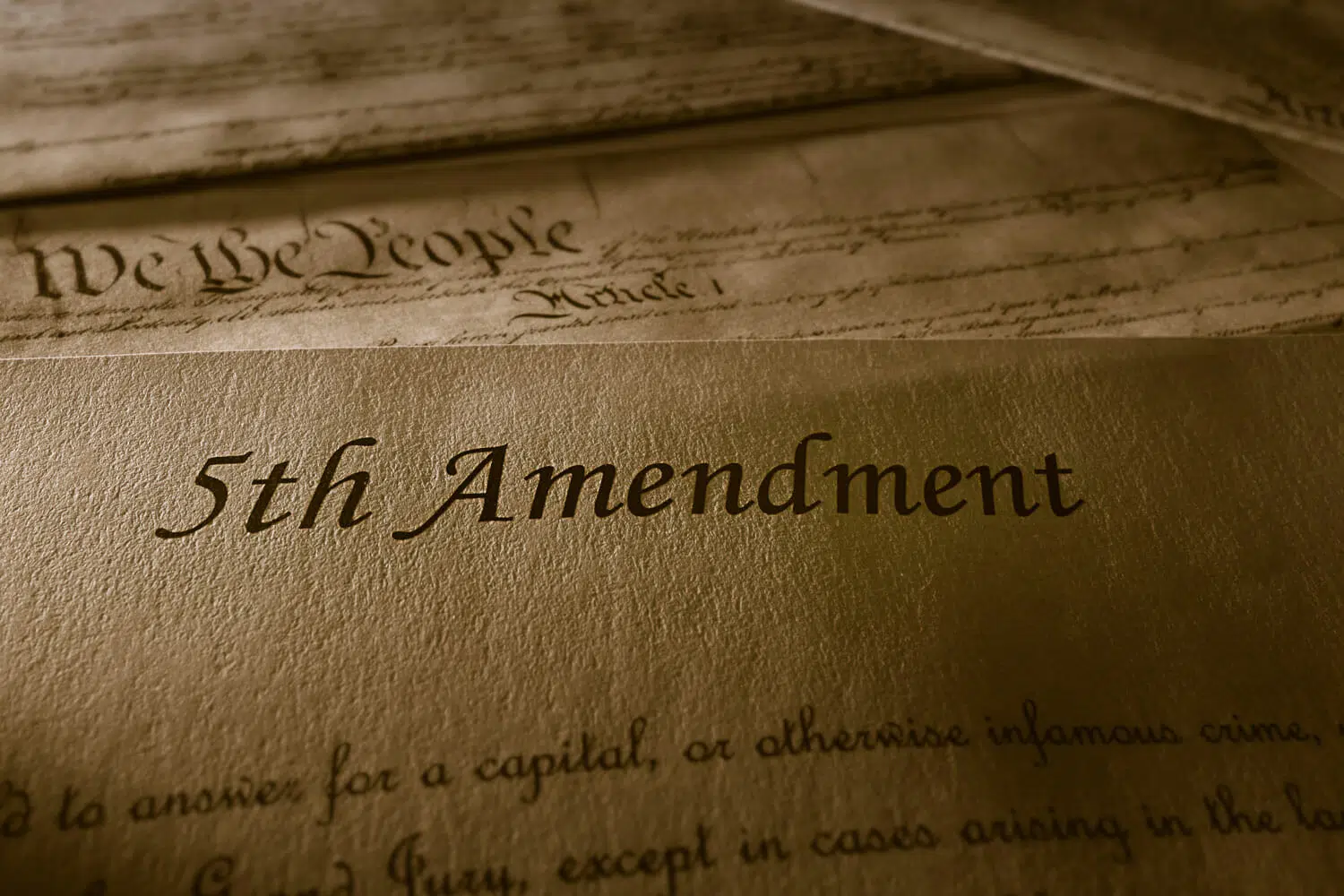“I plead the Fifth.” It refers to Amendment V of the beloved and revered United States Constitution. Can the Fifth Amendment help your Virginia divorce case?
Amendment V
Our very own James Madison, esteemed Virginia lawyer, signer of the Constitution, and fourth president of the United States, penned Amendment V:
“No person shall be held to answer for a capital, or otherwise infamous crime, unless on a presentment or indictment of a Grand Jury … ; nor shall any person be subject for the same offence to be twice put in jeopardy of life or limb; nor shall be compelled in any criminal case to be a witness against himself, nor be deprived of life, liberty, or property, without due process of law …”
Madison’s amendment proscribed self-incrimination, giving rise to that TV trope, “I invoke my right not to incriminate myself.” Every TV lawyer from Gomez Addams to Ally McBeal to Sam Waterston has been stopped dead in their tracks by this utterance. (Well, maybe not Gomez; too busy blowing up model trains.)
Not So Fast, Buster!
But look again at Madison’s wording:
“… nor shall be compelled in any criminal case to be a witness against himself…”
Divorce is a civil action. What then?
Then we rely on state laws and state constitutions. The United States Constitution is the supreme law of the land, but it explicitly states in Madison’s 10th Amendment, “The powers not delegated to the United States by the Constitution, nor prohibited by it to the States, are reserved to the States respectively, or to the people.”
Does Virginia have anything to say about this?
It Just So Happens, Virginia Has a Mouthful
Virginia’s legal Code includes this nugget, just revised July 1, 2020 in Virginia Code § 8.01-223.1:
In any civil action, the exercise by a party of any constitutional protection shall not be used against him, except that in any civil proceeding for spousal support, custody, or visitation under Title 16.1 or any civil action for divorce or separate maintenance under Title 20 filed on or after July 1, 2020, if a party or witness refuses to answer a question about conduct described in subdivision A (1) of § 20-91 or in § 18.2-365 on the ground that the testimony might be self-incriminating, the trier of fact may draw an adverse inference from such refusal.
It’s no Madison, we admit, but it does allow a Virginia Circuit Court judge to consider your silence with something called “adverse inference.”
The judge is legally able to interpret your “No comment,” or “I invoke my right against self-incrimination,” or “I plead the Fifth” to mean the worst possible outcome for you:
- Her lawyer: “Sir, did you have an adulterous affair with Tootsie LaTour while married to Polly Pureheart?”
- You: “I plead the Fifth.”
- Her lawyer: “So you did it! We can assume you did or else you would have denied it.”
- Your lawyer: “Your honor, I object! Witness is only invoking his constitutional rights.”
- Judge: “Overruled. I can take an adverse inference from his refusal to answer. He did it. Or should I say, he did her.”
Adultery Proven
This change to the law means accusations of adultery are more easily proven than they were before the change. Adultery is a fault ground for divorce in Virginia.
Say she accused you of adultery; you pleaded the Fifth; the court could not assume your refusal to speak to the details meant you were an adulterer.
Now it can. Now it can assume the reason you chose not to answer the charge is because you knew you were guilty of a Class 4 misdemeanor (you’ll find that under Virginia Code § 18.2-365). The fine is only $250 or less, but it does generate a criminal record against you.
Ouch!
Suppose, though, you simply deny the charge. If your divorcing wife’s attorney can prove you committed adultery, you now have perjury added to your adultery. Perjury is a Class 5 felony. That carries a fine of up to $2,500, plus jail time of one to 10 years.
Ouch!
Ouch!
The effect of this revised law is that the spouse charging adultery has a much easier time proving it. She still needs clear and convincing evidence of adultery:
- Eyewitness statements and affidavits
- Photographs
- Video recordings
- Credit card receipts
- Hotel registers
Men’s Divorce Attorneys
The adverse inference relieves her and her attorney of some of the burden of proof. Considering all that hinges on a charge of adultery (criminal record, fault grounds, property settlement, spousal support, child custody; the list goes on and on), you and your attorney need to develop a sophisticated and comprehensive strategy to avoid such a charge.
The right attorney to have at your side is a men’s divorce attorney from The Firm For Men. We stand by Virginia’s men, defend their rights, and protect their futures. Contact us today or telephone our offices at (757) 383-9184.

